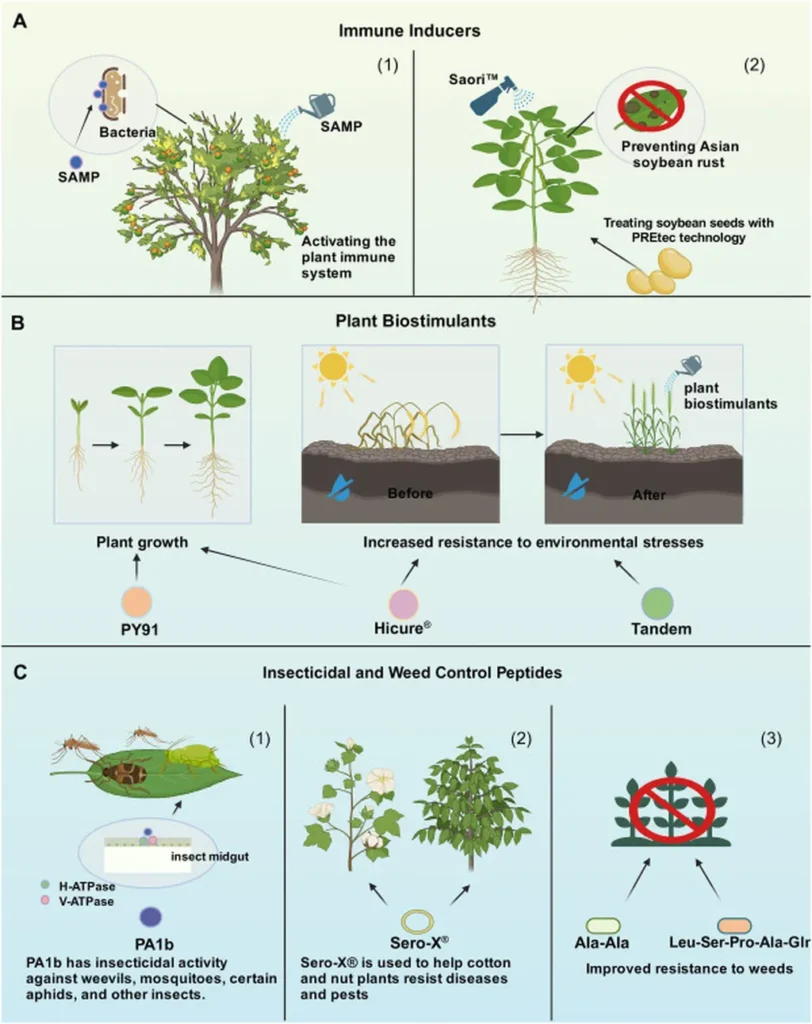In the heart of Vietnam, a team of researchers led by Dr. Dung Minh Ha-Tran from the Laboratory of Ecology and Environmental Management at Van Lang University is unlocking the secrets of nature’s tiny warriors: antimicrobial peptides (AMPs). These small, mighty molecules, derived from plants and microorganisms, are emerging as a game-changer in the quest for stress-resilient crops. Their recent findings, published in the journal *Frontiers in Plant Science* (translated to “Frontiers in Plant Science”), are paving the way for innovative solutions to some of agriculture’s most pressing challenges.
AMPs have long been recognized for their broad-spectrum activity against fungal pathogens, bacteria, and insect pests. However, recent studies have revealed their supportive roles in conferring tolerance to abiotic stresses, such as salinity, drought, and heavy metals exposure. This dual functionality has sparked considerable interest in the agricultural and energy sectors, where crop resilience is paramount.
Dr. Ha-Tran and her team have made significant strides in understanding the functional mechanisms of these peptides. In their latest study, they discovered that a cyclic dipeptide, cyclo(L-Ala-Gly), derived from the bacterium Priestia megaterium BP01R2, enables salinity stress alleviation in plants. This finding is particularly noteworthy, as salinity affects approximately 20% of irrigated lands worldwide, posing a substantial threat to global food security and bioenergy feedstock production.
Moreover, the team’s research revealed that another cyclic dipeptide, cyclo(His-Pro), plays a crucial role in navigating carbon flux from glycolysis to the pentose phosphate pathway in Arabidopsis, a model plant species. Supplementation with this peptide increased NADPH levels and the NADPH/NADP+ ratio, enhancing the plant’s ability to cope with stress.
The potential commercial impacts of these findings are substantial. By integrating AMPs genes into transgenic crops, farmers could enhance plant resistance to both biotic and abiotic stresses, leading to increased yields and reduced crop losses. This could translate to a more stable supply of crops for the energy sector, where biomass is a critical feedstock for biofuels and bioproducts.
Dr. Ha-Tran emphasizes the broader implications of their work: “Our findings not only advance our understanding of AMPs’ functional mechanisms but also open up new avenues for developing stress-resilient crops. This is a significant step towards sustainable agriculture and food security.”
The energy sector stands to benefit greatly from these advancements. As the world shifts towards renewable energy sources, the demand for bioenergy feedstocks is expected to rise. Stress-resilient crops, fortified with AMPs, could provide a reliable and sustainable source of biomass, contributing to the energy sector’s growth and stability.
The research team’s ongoing efforts to harness peptides in sustainable agricultural practices are a testament to their commitment to addressing global challenges. As Dr. Ha-Tran and her colleagues continue to unravel the complexities of AMPs, the future of agriculture and energy looks increasingly promising.
In the words of Dr. Ha-Tran, “We are just scratching the surface of what these tiny molecules can do. The potential is immense, and we are excited to be at the forefront of this revolutionary field.” Their work serves as a reminder that sometimes, the most significant solutions come in the smallest packages.

